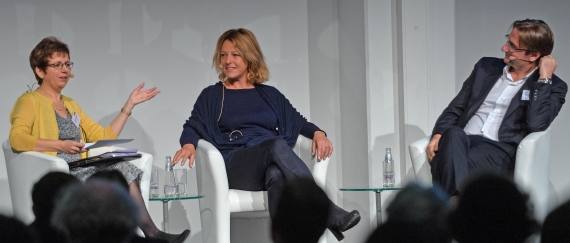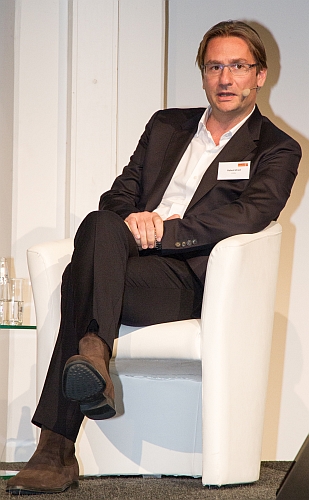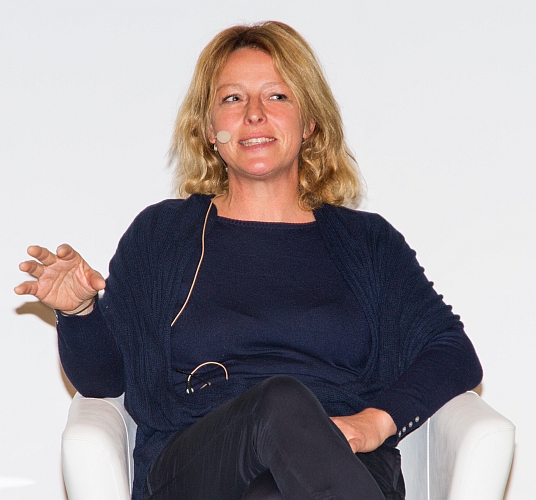10th ITB Hospitality Day 2015: IT and emotions create new hotel concepts
 |
| Two approaches to a hotel concept: moderator Maria Puetz-Willems talking to Gesine Haag of Barefoot Living and Hubert Viriot of Yotel. |
Berlin (March 27, 2015). Two different concepts, but several parallels: The Yotel brand – renowned for its "sleep cabins" in windowless airport hotels and the "Yobot" robot – repeatedly causes surprises within the industry thanks to its innovative power. Freshly founded Barefoot Living follows an entirely different concept: it approaches the hotel business from an emotional aspect instead of solely trusting in design and hardware. An exciting contrast at the 10th "ITB Hospitality Day", the hotel conference of the world's largest tourism trade fair in Berlin early March.
Yotel Hotels were created, because its founder was absolutely thrilled by the luxury of the first-class cabins of British Airways. A rational approach. In contrast, Gesine Haag from the brand and digital business, and the German actor Til Schweiger are creating a resort hotel concept titled "Barefoot Living" based on relaxation. Maria Puetz-Willems, Editor-in-Chief hospitalityInside.com, wanted to know more and found out that both Yotel as well as Barefoot Living translate consumer's desires into the hotel industry and skillfully connect design and digitisation to life values.
Yotel's success story goes on (www.yotel.com). The three hotels in Europe (2 in London and 1 in Amsterdam) and the hotel in New York will soon be joined by 10 new ones in Asia and the US. According to CEO Hubert Viriot, they are already under construction. Room size of Yotels amounts to 15 square metres and only 10 in airport terminal hotels. Here, the rooms are sold up to three times per day in four-hour intervals. The city hotels record an average 3.5 days duration of stay. Per slot, Yotel generates between 40 and 50 pounds (55 to 70 euros) per room at London airport. "The design of our hotels focuses on our guests," says Viriot. They expect security, a certain degree of luxury, space and essential equipment.
 |
|
| Hubert Viriot: encourage guest networking via App. |
Exploiting online, enthusing via social media
Yotel makes it possible that even a 600-room hotel does (almost) not require any reception. Guests check in online. "The check-in process is a waste of time," says Viriot. 95 percent of Yotel's guests check in via mobile phone. 50 percent reserve their rooms via the company's own website, just a few use the call centre. "But there is not much going on," says Viriot.
When it comes to reservations of slot nights at airport hotels, 90 percent of Yotel's guests make an online reservation. As these slots are mostly reserved in advance, it is relatively easy to assign housekeeping for them. "We need less than 10 minutes to clean up these small rooms," explains the manager.
Yobot in New York has turned out to be an accelerator in terms of brand recognition. Those who want to keep their luggage at the hotel can do so via so-called "luggage robots", a nifty forklifter that stores suitcases and bags in free lockboxes against a special fee. Yobot was a successful experiment – and further innovations of this kind are to follow. After all, the Yotel group's motto is "CANI" (constant and never-ending innovation).
A Yotel reduces its public rooms to a single area: the multi-functional "Club Lounge". This helps networking. Guest can expect the hotel to help – both in terms of business as well as establishing contacts with other guests – via App, for example. "We offer local applications like tips for a night out or connections to communities in the city. We've got a spirit of invention in our DNA," explains Viriot. "Our guests appreciate our simplicity. They're not looking for pompous hotels, but they like to link with each other."
40 percent of the guests range between 20 and 40 years of age. "Demographic surveys, however, tell us only little about our guests," says Viriot. The company's target group definition went deeper also including corporate and MICE guests as well as tourists.
Family idylls as a role model
Under the Barefoot Living label, digital entrepreneur Gesine Haag combines mainly high-quality, but comfortable leisure fashion, interior design defined by warm, natural materials, and cuddly home textiles – all available at the online shop. By the way, 50 percent of the buyers are men (www.barefootliving.de).
Actor and director Til Schweiger is the brand's promoter. His villa on Mallorca inspired the team to develop a hotel of similar style, where people feel comfortable just as his friends at his home. A place for the family, relaxed and authentic.
 |
|
| Gesine Haag: authenticity and nature will convince everybody. |
Barefoot Living is geared to the values of the past, without forgetting the future. "Nobody is able to read a map today. You lose your natural senses, if you constantly look on a watch to read the values displayed," says Haag. When thinking of a family hotel, she sees campfires and trees for children to climb. As a brand, Til Schweiger stands for quality and a natural family dad. These were signals that went out to the future target group, which is already interested in Barefoot Living hotels. "We know our customers before building a hotel," says Gesine Haag. When it comes to realisation, this means that guests should be enabled to buy everything they need during their stay.
Systematically using the digitised world
The discussion about digital or non-digital business: Gesine Haag pleaded not to turn off WiFi inside the hotels, but instead limit the areas of availability. "Life doesn't get any easier without light switches. In some areas, digitisation makes sense," said the former Amazon manager thinking of informing guests via messaging service about the departure of fishing boats at sunset, for example. Using social media and IT wisely without losing touch with nature and people – that is the goal of Barefoot Living. For: "The entire hotel experience depends on the people you are in contact with."
What sounds rather labour intensive from a hotel perspective, is not intended to be in real life. "I even think that we need fewer personnel in a Barefoot Living hotel. We approach the whole hotel topic in a different way," she said. The presented image film shows how this could work out: for example, all guests sit at a large table in the garden. Big bowls are placed on the table, and everybody takes part filling their plate themselves. Just like in a large family at home.
Gesine Haag and her team, she says, were "currently in positive talks" with interested hotels who would like to become the first Barefoot Living Hotel." Two of them were located in Germany.
Be it Yotel or Barefoot Living: both concepts want to get people into conversation with each other and highlight local specialties. The only question remaining would be, whether to approach the community in a rational/digital or emotional way. Accordingly, it was not surprising that the vote at the end of the panel was not really meaningful. The question: "Will the digital trend lead to a change in human values?" was answered by 51 percent with "yes", while 49 percent said "no". The audience, it seems, does not trust either approach. / Susanne Stauss
Note of the editing department:
Unfortunately, ITB Berlin will not be able to show the video of this ITB Hospitality Day panel from March 5, 2015 on its YouTube channel. The website says: "Unfortunately, this video is not available in Germany because it could contain music, for which we could not agree on conditions of use with GEMA."
Continuative Links:
- April 10, 2015 Hotel industry out of touch-10th ITB Hospitality Day: 2015 The Sharing Economy wave making everyone sweat
- March 27, 2015 Continual re inventions - 10th ITB Hospitality Day 2015: Lifestyle communication with budget and luxury
- March 20, 2015 The dark side of hotel distribution - 10th ITB Hospitality Day 2015: Only a minority believes in own distribution power
- March 13, 2015 Good base for hackers-ITB Hospitality Day 2015 revealed how to crack codes and webcams
To print this article you have to be registered and logged in for newsletter, visitor or subscription.





